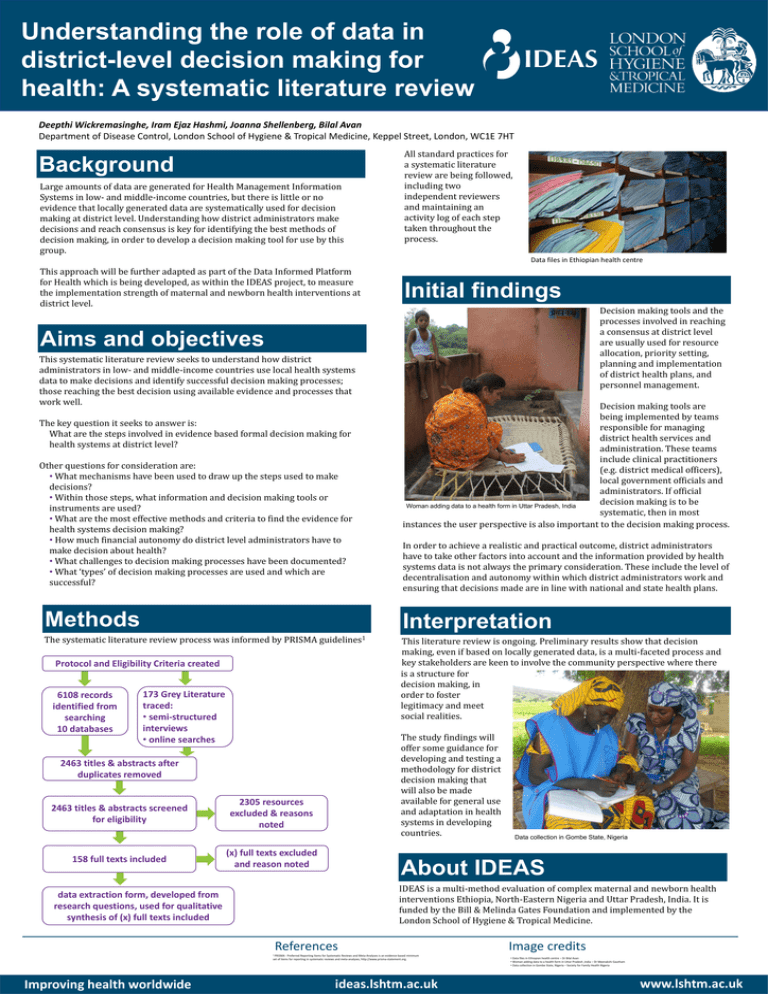Understanding the role of data in district-level decision
advertisement

Understanding the role of data in district-level decision making for health: A systematic literature review Deepthi Wickremasinghe, Iram Ejaz Hashmi, Joanna Shellenberg, Bilal Avan Department of Disease Control, London School of Hygiene & Tropical Medicine, Keppel Street, London, WC1E 7HT Background Large amounts of data are generated for Health Management Information Systems in low- and middle-income countries, but there is little or no evidence that locally generated data are systematically used for decision making at district level. Understanding how district administrators make decisions and reach consensus is key for identifying the best methods of decision making, in order to develop a decision making tool for use by this group. All standard practices for a systematic literature review are being followed, including two independent reviewers and maintaining an activity log of each step taken throughout the process. Data files in Ethiopian health centre This approach will be further adapted as part of the Data Informed Platform for Health which is being developed, as within the IDEAS project, to measure the implementation strength of maternal and newborn health interventions at district level. Initial findings Decision making tools and the processes involved in reaching a consensus at district level are usually used for resource allocation, priority setting, planning and implementation of district health plans, and personnel management. Aims and objectives This systematic literature review seeks to understand how district administrators in low- and middle-income countries use local health systems data to make decisions and identify successful decision making processes; those reaching the best decision using available evidence and processes that work well. The key question it seeks to answer is: What are the steps involved in evidence based formal decision making for health systems at district level? Other questions for consideration are: • What mechanisms have been used to draw up the steps used to make decisions? • Within those steps, what information and decision making tools or instruments are used? • What are the most effective methods and criteria to find the evidence for health systems decision making? • How much financial autonomy do district level administrators have to make decision about health? • What challenges to decision making processes have been documented? • What ‘types’ of decision making processes are used and which are successful? Decision making tools are being implemented by teams responsible for managing district health services and administration. These teams include clinical practitioners (e.g. district medical officers), local government officials and administrators. If official decision making is to be Woman adding data to a health form in Uttar Pradesh, India systematic, then in most instances the user perspective is also important to the decision making process. In order to achieve a realistic and practical outcome, district administrators have to take other factors into account and the information provided by health systems data is not always the primary consideration. These include the level of decentralisation and autonomy within which district administrators work and ensuring that decisions made are in line with national and state health plans. Methods Interpretation The systematic literature review process was informed by PRISMA guidelines1 This literature review is ongoing. Preliminary results show that decision making, even if based on locally generated data, is a multi-faceted process and key stakeholders are keen to involve the community perspective where there is a structure for decision making, in order to foster legitimacy and meet social realities. Protocol and Eligibility Criteria created 6108 records identified from searching 10 databases 173 Grey Literature traced: • semi-structured interviews • online searches The study findings will offer some guidance for developing and testing a methodology for district decision making that will also be made available for general use and adaptation in health systems in developing countries. 2463 titles & abstracts after duplicates removed 2463 titles & abstracts screened for eligibility 2305 resources excluded & reasons noted 5 158 full texts included (x) full texts excluded and reason noted 7 9 Data collection in Gombe State, Nigeria About IDEAS IDEAS is a multi-method evaluation of complex maternal and newborn health interventions Ethiopia, North-Eastern Nigeria and Uttar Pradesh, India. It is funded by the Bill & Melinda Gates Foundation and implemented by the London School of Hygiene & Tropical Medicine. data extraction form, developed from research questions, used for qualitative synthesis of (x) full texts included References 1 PRISMA - Preferred Reporting Items for Systematic Reviews and Meta-Analyses is an evidence-based minimum set of items for reporting in systematic reviews and meta-analyses, http://www.prisma-statement.org Improving health worldwide 1 ideas.lshtm.ac.uk Image credits • Data files in Ethiopian health centre – Dr Bilal Avan • Woman adding data to a health form in Uttar Pradesh ,India – Dr Meenakshi Gautham • Data collection in Gombe State, Nigeria – Society for Family Health Nigeria www.lshtm.ac.uk











